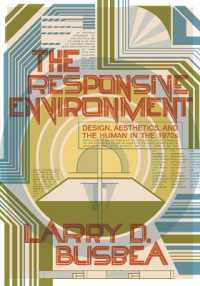- ホーム
- > 洋書
- > 英文書
- > Religion / Ethics
Full Description
The Nature of Church Camp: An Environmental History of Outdoor Ministry, 1945-1980 by Christopher W. Anderson explores the mid-twentieth-century history of religious camps and retreat centers to provide new insights into the history of environmentalism in the United States. Ecumenical Protestantism and the ecology movement both changed the calculus of American morality after World War II. Through archival material, case study visits, and oral histories, Anderson finds that these institutions often reacted to ecological critiques with temperate but gradual reforms. However, camps and outdoor ministries, by virtue of their natural settings and sizable acreage, soon provided a new way to explore the history of spirituality and ecology, moving away from the conference campus and using nostalgia for the frontier instead to make arguments about the meaning of the American nation and the value of democracy. This new way of thinking was reflected throughout the camps and enthusiastically endorsed decentralized small-group camping. By examining the conduct of church camps and conferences before, during, and after the ecological era, Anderson shows how environmental stewardship became the dominant paradigm for Protestant environmentalism, why that is a flawed and fractious model, and why it has stalled.
Contents
Acknowledgments
Introduction
Chapter 1: Nature as Campus: Conference Centers as Institutions
Chapter 2: Confronting Conservationism and Communism at Camp
Chapter 3: Nature as Frontier: Camping for Democracy
Chapter 4: Confronting American Society at Camp
Chapter 5: Confronting Ecology and Environmentalism at Camp
Chapter 6: Nature as Wilderness: Retreat Centers and the Individual
Conclusion
Bibliography
About the Author








